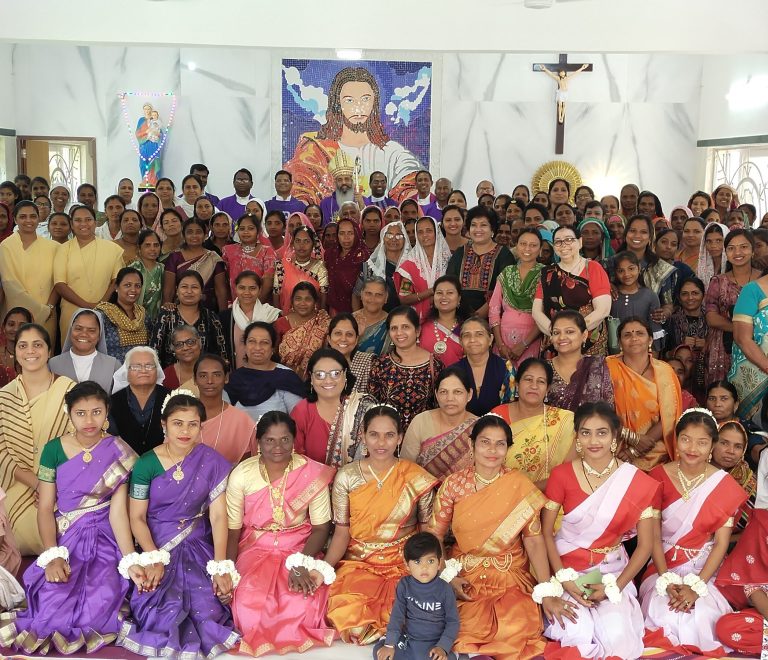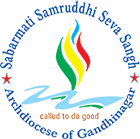Ongoing Programs

Empowerment
- Sangath Vidhya – livelihood skills for Archdiocesan Cooperative members (MISSIO): 2022 to 2023
- Skill Training Program – (Archdiocese of Toronto) Nov. 2022 to Conti…
The Project directly focuses on Cooperative Members of Women Cooperative Society from Mandali, Mehsana & Siddhpur in the Archdiocese of Gandhinagar. Organization addresses the quality of vocational education (skill training) for Cooperative Members by supporting three existing registered women cooperatives. These centres cater to vocational education like Modern Tailoring (Fashion Designing) and Beautician classes for Cooperative members. It also enhances their learning capacity, personality development, professionalism and moral values.
The project benefits three registered women cooperative societies who are poor, widow, disable, economically and socially marginalized.
FRONTEX: 2019 to Conti…
European Return and Reintegration Network (ERRIN) Programme helps illegal migrants to get back to our home country in a dignified manner and further supports in business, livelihood, establishment, Education and vocational training to the returnees, medical assistance and also take care of the other important aspects such as legal migration, pre & post counseling and documentation.
Health
Sabarmati Samruddhi Seva Sangh (SSSS) is working for the health of rural women and children for the last 20 years. It helps in reducing maternal mortality and child mortality, malnourishment in anemic women, children aged from 0 to 6 years, pregnant women and lactating mothers. It aims for safe and normal delivr in the hospitals, nutritious diet for mothers, children and adolescent girls. SSSS conducts regular awareness programme on organic farming, gram sabha, organic fertilizer and medicines, growing of millets preserving of traditional seeds and nursing kitchen gardens. SSSS make efforts to bring about change in the health sector by training the community educators and imparting the knowledge in their own village and neighbouring villages. SSSS conducts subject related competitions and camps and help people to link with government schemes
Our Reach :

Our Focus Areas:
- Sangath Vidhya – livelihood skills for Archdiocesan Cooperative members (MISSIO): 2022 to 2023
- Skill Training Program – (Archdiocese of Toronto) Nov. 2022 to Conti…
- Nutrition
- Nutrition
- Nutrition
- Health and Hygiene
Our Impact:
- 3138 families have cultivated 10 to 12 vegetable in organic kitchen garden.
- 435 women farmers are selling the organic vegetable at local market from the kitchen garden
- 9300 Fruits plant plantation by women farmer & children
- 924 Applications submitted in Panchayat/Gram Sabha.
- 1616 of children are treated in the paediatrics camp
- 3720 children and women are participated in the hand wash day
- 90% women go for ANC & PNC checkup at Government Hospital
- 510 People linked to Government Health schemes
- 451 Moderately Malnutrition Children are treated
- 222 Severely Malnourished Children are treated
- 104 T.B Patient are Treated
- 459 Anaemic women are healthy
Capacity Building of Community Educators:
31 community Educators women and men are rendering their services at the village level in the health programme. They trained different groups of pregnant women, lactating mothers, teenager girls and mother-in-law on health topics/issues. Therefore, to enhance the capacity of Community Educators, they are periodically trained by experts in their respective fields. Which are as follows.
- Training on Leadership
- Training on prepare Nutrition food
- Training on ANC & PNC
- Training on Complete Immunization
- Training on Child Diseases
- Training on Right to Food
- Training on Organic Farming
- Training on INM /IPM
- Training on Organic Kitchen Garden
- Training on Demo Gram Sabha
Village Level Activities:
Pediatric Camps: In Aravalli district 54 villages of pediatric camps were conducted through these camps, we were able to help many children with medicines. We were also able to mother with some tips, advice and solution for the children. It has helped us to know the health condition of many children. We are also happy that whatever the awareness programs we have conducted we have seen the difference it has made in the health of mothers and children. There are many medical facilities government is providing but people are not receiving timely help but through these programmes many have benefited. The C.Es who has the information they guide them and also many times they accompany them to hospitals and for other medical help they need.
Hand washday: hand was day was organized in the schools and villages Children were taught how to wash the hand and were instructed to wash hand before eating and drinking water. They were also made aware about the different sickness and worms they get if they are not careful. After this program the schools has made it sure that children wash their hands with soap. Also in the village, we have seen difference in hygiene. The C.E also keeps them reminding and encouraging whenever there is visit to make sure that it becomes good habits for children. Total 1587 children participated in these events.
Nutrition Week: In nutrition week, women and children were encouraged to eat green & fresh vegetables, drumsticks, fruits and discouraged giving packet food to children. Though cow/ buffalo milk is available, most of the women and children do not consume but sell to others for a price. Through this nutrition week, they understood the advantage of adding milk in their diet. Women gained skill and knowledge to plant papaya, banana, guava, drumstick etc. Total 500 numbers of women and children participated in these events.
Health Diet Competition women and adolescent girls are participated. 10-12 women from the each village came up with different food items. Through this programme women were encouraged to prepare different items with available vegetables in their fields. The women are preparing different items by using green vegetables, drum-sticks and sprout beans. They are happy that they have learned many ways to eat different vegetables. They have learnt to make palak soup, chapatti with green leaves( methi Thepla), Mix vegetables, Dal fry with different vegetables and many other ways to eat healthy food.
Awareness on health topics to community
The focal point of these awareness was to make the community aware of the malnutrition signs, symptoms, causes, diagnosis, treatments and prevention, right to food, prepare nutrition food like soup, salad, vegetable curry, etc…. and to act according to the situation with the help of government medical staff doctors, nurses, anganwadi worker (kindergarten teachers) and health worker and partners. In this awareness programme, people from the villages were able to identify those children who are underweight and a number of women who were severely anemic. Targets were set to support these women and children especially through the guidance of the C.Es and support of the government staff.
Training Programme on Promotion of organic manure and fertilizers: In order to promote sustainable agriculture training on INM and IPM have been conducted in almost all project villages. The objective of these trainings was to help communities develop local substitutes for the costly inputs that they purchase from the market. It was encouraging to see that project have especially the women farmers are taking much more active participation in preparing these solutions locally and making use of applying the same in food crops and vegetables for protection and its proper growth. The cost of making these solutions is much cheaper than the pesticides available in the markets. The ingredients used to prepare INM/INM are locally available in abandons an in most cases it is free of cost, as a result these initiatives by the community members are not only reducing their dependency on market but also saving good amount of money for the family.
Training programme on Nutrition Garden for adolescent girls and women farmers: Each village was given separately which was kept in Anganwadi in villages. Women and adolescents girls from each village participated in the trainings C.Es are came to give this training. C.Es explained to the Participants whatis the nutrition garden, what its benefits are and how to create a nutrition garden. With this, C.E showed the participants which vegetables should be planted in this nutrition garden according to the season and which fruit trees should be there.
Trainings on governance and schemes related to agriculture, FNS and livelihoods. : The main objective of organizing this training program was to provide information on various government health schemes and supporting documents required while applying for a particular scheme and also to provide direct and correct information about the scheme to the community and remove obstacles in the process of availing.
Trainings on sustainable crop management and food diversity: In which C.E explained about understanding about agriculture, what are its types, with this, C.E came to understand that the best way to cultivate is organic farming. What is the significance of this method of farming? In the same way, the government has stated the benefits of farming in this way. Organic farming improves the soil and the grains cooked in it are free from chemicals, which can prevent the spread of disease
Demo Gram Sabha in villages: The main objective of the training was to make the village people understand the rules and constitution of how a Gram Sabha is convened and where government officials are present. Trainer said that what kind of questions could be discussed in the gram Sabha and played a role on how the Gram Sabha should be held. He put all his efforts to make them understand the topic in very distinct and clear terms. Organizing Demo Gram Sabha meetings have motivated project participants to attend such meetings. During the reporting period big number of project participants took part in the Gram Sabha meeting and put forward their issue of concerns in writings, and of the of the concerns have been considered by the Gram Panchayats.
Migrants
Pravasi Bandhu – Safe Living and working conditions of Migrant workers ensured through collectivization and responsive systems (Caritas India) 2021 to Conti…
Increased access to Social protection and social security benefits through the implementation of migrant friendly social policy.
Dignity of migrant workers protected through national/state networks and cooperation with government systems.
The programme focus on empowering migrant workers at the destination. Migrant Resource Centers provide information and support to migrant workers at both zone.
About Company
Trust Reg. No.:
F/1033/Gandhinagar
Society Reg. No.:
Guj/1077/Gandhinagar
80G Reg. No.:
CIT/GNR/80G-GNR-12/2013-14
Addresses
Registered Office :
Archbishop’s House,
Sector – 8,
Gandhinagar – 382 008
Administrative Office :
Shantivan Jeevan Vikas Kendra,
Randheja Road, Pethapur,
Gandhinagar – 382 610
Contact Us
Office:
Residence:
© 2024 Sabarmati Samruddhi Seva Sangh (SSSS) – All Rights Reserved.
